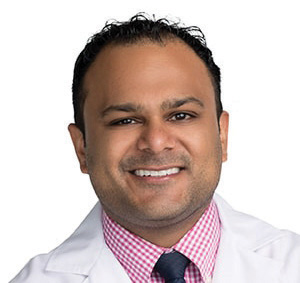Meet Dr. Heeren Makanji

We are pleased to have a leading spine expert, Dr. Heeren Makanji, join our team. He shares some valuable information about his background, his philosophy of care, and some of the newest treatment options. Call (860) 549-8252 to schedule a visit.
What is your academic background?
I received my Bachelor and Master of Science degrees as an Honors and University Scholar from the University of Connecticut, graduating summa cum laude. I attended Harvard Medical School, graduating with similar honors. I continued at Harvard with the Harvard Combined Orthopaedic Residency Program at Massachusetts General Hospital/Brigham and Women’s Hospital / Beth Israel Deaconess Medical Center, where I was appointed chief resident. I received fellowship training in Orthopaedic Spine Surgery at the Rothman Institute and Thomas Jefferson University in Philadelphia, where I was a clinical instructor in orthopedic surgery.
What are your areas of specialty?
I specialize in the operative and non-operative treatment of spinal disorders. My expertise and clinical interests include:
- complex cervical and lumbar reconstruction
- minimally invasive, robotic navigation-assisted spine surgery
- treatment of degenerative conditions as well as tumors, trauma, and infections
What made you select spine as your specialty?
I really enjoy the ability to help patients who face extreme pain and provide them with relief. It is rewarding to see patients make tangible improvements which can enhance their quality of life and mobility. I also had excellent mentors in the field who found satisfaction in this career path and how their patients fared.
Do you only see patients who require surgery?
Absolutely not. Eighty to ninety percent of the patients I see do not need back surgery. They can be dramatically helped with the use of anti-inflammatories, physical therapy, injections, and reassurance. There is a small subset of patients who fail conservative measures and then spine surgery becomes a viable option.
A big part of my role is diagnosis and determining the optimal treatment plan. The difference between a good and a great spine surgeon is the one who figures out those patients who can truly benefit from back surgery, and those who can be helped by non-operative means. Spine surgery should only be considered when conservative measures are exhausted.
What advancements have there been with spine surgery?
As a surgeon, spine surgery is a challenging endeavor which I really enjoy. Spine surgery has come a long way. One of the biggest shifts is moving away from the traditional posterior approach through the back of the spine. Over the last decade, there has been a shift toward entry from the side or front, which has reduced the recovery time.
Another big innovation is the use of robotics which continues to improve each day. The use of the robot allows us to expedite surgery, make it safer, create smaller incisions, and help improve recovery.
How do you approach patient care?
During my initial evaluation, I focus on getting an accurate diagnosis and introduce conservative measures. There are very few issues that require drastic steps unless there is trauma or an infection. My goal is to create a roadmap for my patients so they know what to expect every step of the way. I like to provide a very high-level overview so they know their plan of care, what will happen if no improvements are made, and where we will go from there. I try and give patients an idea of the natural progression of their care so there are no surprises.
How do you share your expertise and remain current on the latest advancements in spine care?
I currently sit on the editorial board for Clinical Spine Surgery, a peer reviewed publication. I am an author and reviewer for Orthobullets, an online platform used by thousands of residents and attending physicians for orthopaedic content and training.
If I have back pain, should I schedule a visit?
I am happy to see anyone with back or neck pain. If someone has pain that radiates down the shoulder or leg, faces weakness or numbness, or faces ongoing pain, they should definitely come in to see me. Early intervention is important and I would like to help people before they come to me in really bad shape.
Where do you see patients?
I currently see patients in our Hartford, Glastonbury, and Farmington offices. Later this fall, I will also see patients in our new office in Enfield. I am supported by my Medical Executive Assistant, Nyree O’Reilly. To schedule an appointment, call (860) 549-8252.